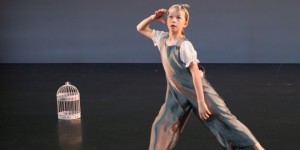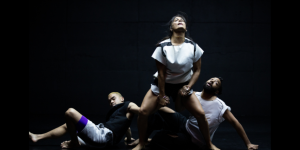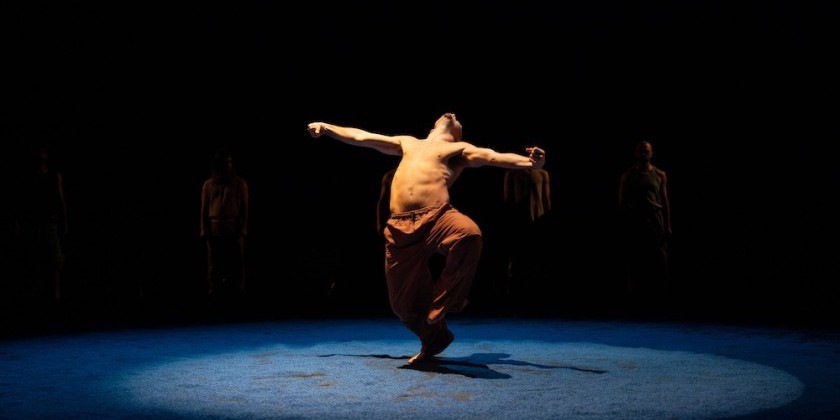IMPRESSIONS: Ashley R.T. Yergens' “SURROGATE” at New York Live Arts

Choreographer and Director: Ashley R.T. Yergens
Performers: Ashley R.T. Yergens, Justin Faircloth, Maddie Schimmel, Mur, Nicola Gorham
Musicians: Andrea Bocelli, Celine Dion, Eiffel 65, Imogen Heap, Wurlitzer 157 Carousel Organ
Composer: “Frozen Potential,” original song and composition by Mur
Costume designers: Maddie Schimmel and Mur
Lighting Designer: Jennifer Fok
Ashley R.T. Yergens’ SURROGATE is a work long in the making. Commissioned shortly before the pandemic, Yergens’ highly personal exploration of transmasculine reproductive politics was shattered, shelved, and repaired through years of growth and change. This disruptive deepening has its benefits: after long gestation, SURROGATE comes to light shot through with evidence of its accumulative power.

The intimate studio performance space at New York Live Arts brims with scenic elements, props, and unexplained objects arranged as a haphazard altar to lived and imagined realities. Through the work’s 40 dense minutes, a patchwork of short scenes scrolls by, tenuously connected through a web of visceral threads and a well of referential source material. Yergens indicts and embraces pop culture iconography, social expectations, and political extremes to center a perspective that, while particular, points to the universalizing potential of revealed interiorities.

Overt and implicit references augment Yergens’ testimony — he performs only as a disembodied voice — and the work’s four performers act as surrogates for his experience. Subject matter spans clinical and emotional frames, which the performers dance, sing, and speak to approach an elusive picture of reproduction from the transmasculine perspective. Yergens voices the multiplicities of trans identity, the fraught polarities of the biological urge to procreate and the dehumanization of medical processes, and the absurdity that pervades mainstream discussions of surrogacy. Musical choices point to Yergens’ interest in lowbrow culture as a barometer for social climate and vehicle for shared understanding as his raucous scattering crumbles and coheres through cycles of dramatic shadows and lurid neons.

With this foundation, SURROGATE unfolds as a chaotic string of vignettes—one that concerns itself intimately with transitions by largely eschewing or refusing them. Performers creep and rush through the space’s multiple doors in a flurry of cartoonish entrances and exits, with each scene deepening into an acerbic yet beatific sense of camp. As the central character (or characters), dancer Justin Faircloth morphs through an exhausting array of roles and registers. As an auditioning sperm donor, he tears through a melodramatically virtuosic solo with shades of competitive dance; his technical precision and comic timing impeccably ground a parody that is deadly serious. Maddie Schimmel, clad in assless khakis and a Party City polo, joins Faircloth in a clubby duet packed with tightly measured unisons and dynamic partnering. Amid the mess of objects they introduce and manipulate, their steely technicality acts as a conduit to make sense of the body through demand, exertion, and exhaustion.

Text and song interwoven throughout the work support and bounce against dance and physical tasks as translations of visceral intuition and confrontations of social norms. Actress Nicola Gorham, sleek and unflinching, delivers a monologue drawn from social media comments and messages directed at Yergens during his very public transition. The barbs stream out of her: rants on toxic masculinity and indictments of queer culture swirl together, her frankness a foil to the anxiety the words generate in the listener. Amid this hyperstimulating rush and tumble, “SURROGATE”’s grand finale comes all too quickly: an original song composed and sung by performance artist Mur, who emerges from a rolling hamper filled with trash. In the surrogacy paradigm they are an embryo with a deathwish, a masked figure of “frozen potential” who yearns for the agency to be discarded and set free.

Yergens’ offering on transmasculine reproduction and surrogacy politics does not propose answers or even strive for legibility. He chooses instead to push against the confinement and stratification of social definitions to lay bare the messiness of trans identity and experience — an urgent and timely call that merits further exploration.

















